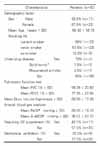Abstract
Background
Surgical lung biopsy is required to establish the etiology and stage of interstitial lung disease(ILD). and this procedure can be safe and meaningful for making clinical decisions. We wanted to determine the safety of surgical lung biopsy(SLB) in patients with interstitial lung disease(ILD).
Methods
We conducted a retrospective review of 40 patients with suspected ILD and they underwent surgical lung biopsy from January 2001 to June 2006 at Chungnam University Hospital. We analyzed retrospectively according to their age, gender, pulmonary function, chest tube duration, the arterial blood gases, the procedural technique, and the requirement for supplemental oxygen and mechanical ventilation(MV) at the time of SLB.
Results
The mean age of the patients was 56.4±16.13 years(range: 21 to 77 years). Overall, the 30-day and 90-day mortality rates were 15% and 20%, respectively. The predictors of perioperative mortality were either the need for mechanical ventilation(MV) at the time of SLB or the need for supplemental oxygen prior to undergoing SLB. Among the 32 patients who were 90-day survivors, the proportion of those patients using the oxygen supplement was 28.1% (n=9). All 8 patients who were 90-day non-survivors used oxygen supplement (p=0.000). The use of the MV was 12.5% (n=4) in the 90-day survivors (n=32) and 62.5% (n=5) in the 90-day non-survivors (n=8); there was a significant difference between the 90-day survivors and non-survivors (p=0.000).
Figures and Tables
Figure 1
Diagnosis at surgical lung biopsy.
*usual interstitial pneumonia, †non-specifically defined diagnosis, ‡drug (n=3), desquamative interstitial pneumonia (n=1), acute interstitial pneumonia (n=2), §cryptogenic organizing pneumonia, ∥non-specific interstitial pneumonia.

References
1. Raghu G. Interstitial lung disease: a diagnostic approach. Are CT scan and lung biopsy indicated in every patient? Am J Respir Crit Care Med. 1995. 151:909–914.
2. American Thoracic Society. European Respiratory Society. American Thoracic Society/European Respiratory Society International Multidisciplinary Consensus Classification of the Idiopathic Interstitial Pneumonias: This joint statement of the American Thoracic Society (ATS), and the European Respiratory Society (ERS) was adopted by the ATS board of directors, June 2001 and by the ERS Executive Committee, June 2001. Am J Respir Crit Care Med. 2002. 165:277–304.
3. Hunninghake GW, Lynch DA, Galvin JR, Gross BH, Müller N, Schwartz DA, et al. Radiologic findings are strongly associated with a pathologic diagnosis of usual interstitial pneumonia. Chest. 2003. 124:1215–1223.
4. Raghu G, Mageto YN, Lockhart D, Schmidt RA, Wood DE, Godwin JD. The accuracy of the clinical diagnosis of new-onset idiopathic pulmonary fibrosis and other interstitial lung disease: a prospective study. Chest. 1999. 116:1168–1174.
5. Popper HH. Which biopsies in diffuse infiltrative lung diseases and when are these necessary? Monaldi Arch Chest Dis. 2001. 56:446–452.
6. Kramer MR, Berkman N, Mintz B, Godfrey S, Saute M, Amir G. The role of open lung biopsy in the management and outcome of patients with diffuse lung disease. Ann Thorac Surg. 1998. 65:198–202.
7. Mouroux J, Clary-Meinesz C, Padovani B, Perrin C, Rotomondo C, Chavaillon JM, et al. Efficacy and safety of videothoracoscopic lung biopsy in the diagnosis of interstitial lung disease. Eur J Cardiothorac Surg. 1997. 11:22–24.
8. Crystal RG, Gadek JE, Ferrans VJ, Fulmer JD, Line BR, Hunninghake GW. Interstitial lung disease: current concepts of pathogenesis, staging and therapy. Am J Med. 1981. 70:542–568.
9. Shim YS. Recent advances in diffuse interstitial lung disease. Tuberc Respir Dis. 1989. 36:193–207.
10. Zompatori M, Bna C, Poletti V, Spaggiari E, Ormitti F, Calabro E, et al. Diagnostic imaging of diffuse infiltrative disease of the lung. Respiration. 2004. 71:4–19.
11. Wilcox AG. Advances in radiology for interstitial lung disease. Curr Opin Pulm Med. 1999. 5:278–283.
12. Catterall JR, McCabe RE, Brooks RG, Remington JS. Open lung biopsy in patients with Hodgkin's disease and pulmonary infiltrates. Am Rev Respir Dis. 1989. 139:1274–1279.
13. Ferson PF, Landreneau RJ, Dowling RD, Hazelrigg SR, Ritter P, Nunchuck S, et al. Comparison of open versus thoracoscopic lung biopsy for diffuse infiltrative pulmonary disease. J Thorac Cardiovasc Surg. 1993. 106:194–199.
14. Warner DO, Warner MA, Divertie MB. Open lung biopsy in patients with diffuse pulmonary infiltrates and acute respiratory failure. Am Rev Respir Dis. 1988. 137:90–94.
15. Bensard DD, McIntyre RC Jr, Waring BJ, Simon JS. Comparison of video thoracoscopic lung biopsy to open lung biopsy in the diagnosis of interstitial lung disease. Chest. 1993. 103:765–770.
16. Carnochan FM, Walker WS, Cameron EW. Efficacy of video assisted thoracoscopic lung biopsy: an historical comparison with open lung biopsy. Thorx. 1994. 49:361–363.
17. Krasna MJ, White CS, Aisner SC, Templeton PA, McLaughlin JS. The role of thoracoscopy in the diagnosis of interstitial lung disease. Ann Thorac Surg. 1995. 59:348–351.
18. Flabouris A, Myburgh J. The utility of open lung biopsy in patients requiring mechanical ventilation. Chest. 1999. 115:811–817.




 PDF
PDF ePub
ePub Citation
Citation Print
Print






 XML Download
XML Download